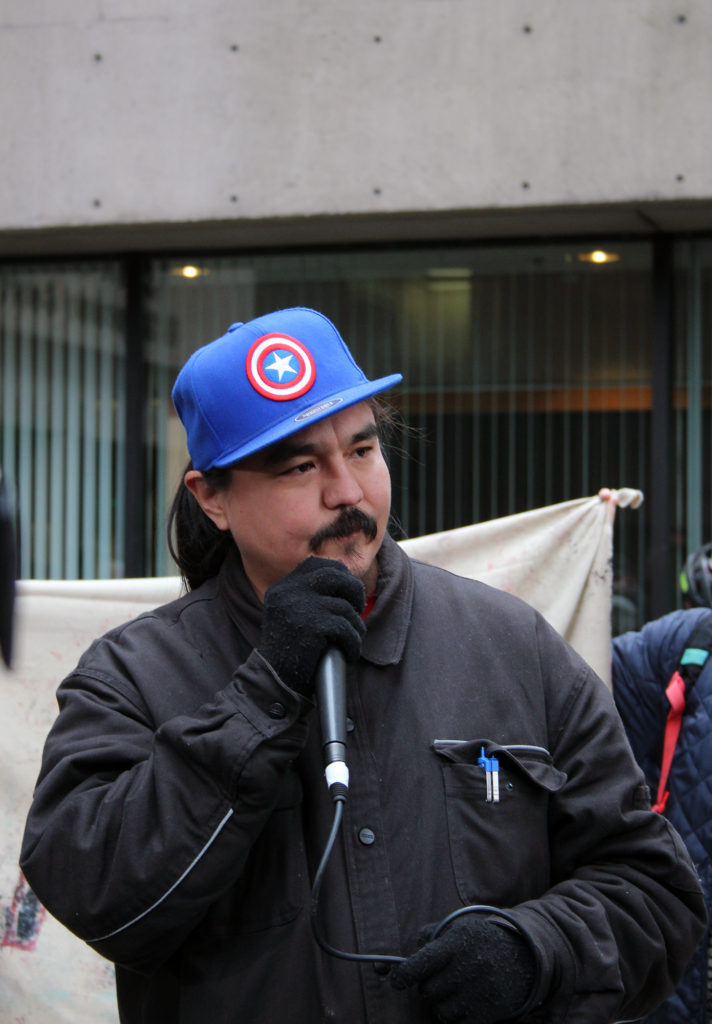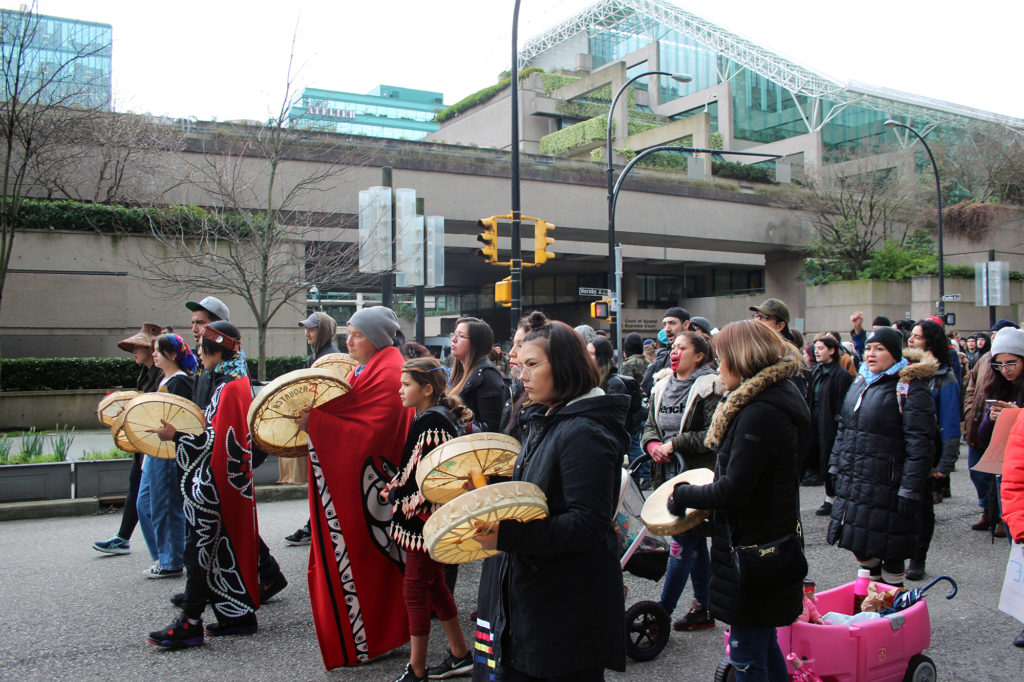Graphic courtesy of Unist’ot’en Camp
By Loose Lips Mag
@looselipsmag
On February 6, in the early hours of the morning, the RCMP began raiding Wet’suwet’en territory under Provincial and Federal watch to enforce an injunction for the Coastal GasLink project, part of TransCanada PipeLines.
Unist’ot’en is one of five clans within the Wet’suwet’en Nation, whose territory spans 22,000 square kilometres in northwest B.C. west of Smithers. The clan has a gated checkpoint that controls access to the territory.
Several land protectors have been arrested since February 6, most of whom have been released without charge.
“People should never be criminalized for standing up for their lands. Our thoughts are for the safety and security of everyone in Wet’suwet’en territory,” Assembly of First Nations National Chief Perry Bellegarde said in a release shortly after news broke that the camp was being raided.
“The RCMP needs to pull back and the federal and provincial Crown needs to step up and create a space for dialogue with the Wet’suwet’en leadership. It’s clear it’s the only way forward.”
The current conflict is just one of many between Indigenous nations across Turtle Island and the government of Canada.
What follows is a timeline of events leading up to the current standoff.
Created with files from Unist’ot’en Camp, Union of British Columbia Indian Chiefs, The Tyee, CBC and CTV BC.
1997
Delgamuukw Supreme Court Case: Landmark decision recognizing that aboriginal title is not extinguished in the areas claimed by Wet’suwet’en and Gixtsan. This case sets criteria for future rulings on aboriginal title. Plaintiffs in the case are all hereditary chiefs.
2007
Wet’suwet’en express will to prevent all pipelines.
On September 13, the United Nations passes The United Nations Declaration on the Rights of Indigenous Peoples (UNDRIP), a non-legally-binding resolution. In article 10, it states that “Indigenous peoples shall not be forcibly removed from their lands or territories. No relocation shall take place without the free, prior and informed consent of the indigenous peoples concerned and after agreement on just and fair compensation and, where possible, with the option of return.”
2008
All five Wet’suwet’en Clans unanimously decide to opt out of the BC Treaty Process, asserting rights and title on ancient jurisdiction belonging to them.
2009
On April 1, Unist’ot’en Clan sets up a gated checkpoint meant to control access to their traditional territory. The checkpoint is on a forest service road about 120 kilometres southwest of Smithers in Unist’ot’en territory at the Morice River Bridge. Over the next few years, construction of a cabin, healing lodge, pit house and a bunkhouse for visitors takes place, thus creating Unist’ot’en Camp.
2015
Hereditary chiefs from all five clans, and Office of the Wet’suwet’en staff, visit camp at the Wedzin Kwa. They assert their support for Unist’ot’en and affirm their opposition on all pipelines.
2018
On November 18, Coastal GasLink Pipeline LTD applied for an injunction and served Unist’ot’en Camp with a notice for a civil lawsuit, seeking to remove the checkpoint. They sought an “interim, interlocutory or permanent injunction,” as well as financial damages for “occupying, obstructing, blocking, physically impeding or delaying access” to their own, unceded territory.
On December 14, the injunction was granted and land defenders were given 72 hours to vacate.
2019
On January 7, there was a RCMP tactical unit assault on Gidimt’en Checkpoint, spelling trouble for the Unist’ot’en Checkpoint, which is 22 km away.
On January 8, solidarity actions in support of the Wetsu’wet’un happened in more than 70 cities around the world, in response to the violent state aggression on unarmed people the day before.
On the last day of the year, the BC Supreme Court granted an injunction against Wet’suwet’en blockades.
2020
On February 6, in the early hours of the morning, the RCMP executed a raid on Wet’suwet’en territory. They continue to carry out the raid on unceded territory under Provincial and Federal watch to enforce Coastal GasLink’s injunction.
Starting on February 6, several demonstrations take place in solidarity with Wet’suwet’en Nation across Canada, including a blockade at the Port of Vancouver, a rail blockade in New Hazelton, rail blockades at 6 nations, Listuguj Mi’gmaq, and Montreal, as well as Indigenous Youth being locked down at the BC Legislature in Victoria. As a result, BC NDP Leader John Horgan’s throne speech was cancelled.
On February 12, a press conference takes place outside of the B.C. Supreme Court, where an injunction to disperse a blockade infront of the city’s ports was filed. The gathering started a march of land defenders and allies across the city, and led to a blockade of the Granville Street Bridge later that day.


Updates continue as the story develops.
So, what can you do?
Here are some tools and resources you can access to stand in solidarity with Wet’suwet’en as the fight continues.
- Watch live streaming video from the Unist’ot’en Camp:
- Check out the Wet’suwet’en Supporter Toolkit: http://unistoten.camp/supportertoolkit2020
- Donate to the Unist’ot’en Legal Fund: https://actionnetwork.org/fundraising/unistoten2020legalfund
- Attend demonstrations where you can by checking out the call-out for solidarity page: http://unistoten.camp/alleyesonwetsuweten
- Gidimt’en Call to action: www.yintahaccess.com
- Donate to Gidimt’en camp: https://www.gofundme.com/f/gidimt039en-strong
With files from Unist’ot’en Camp

Kristi and Brittany are the co-founders and co-editors of Loose Lips Mag. Together, they’re building their feminist media empire—leaving the patriarchy, charcuterie boards and empty bottles of wine in their wake. Loose Lips Media is grateful to operate on the unceded Coast Salish territory of the Musqueam, Squamish and Tsleil-Waututh First Nations.




